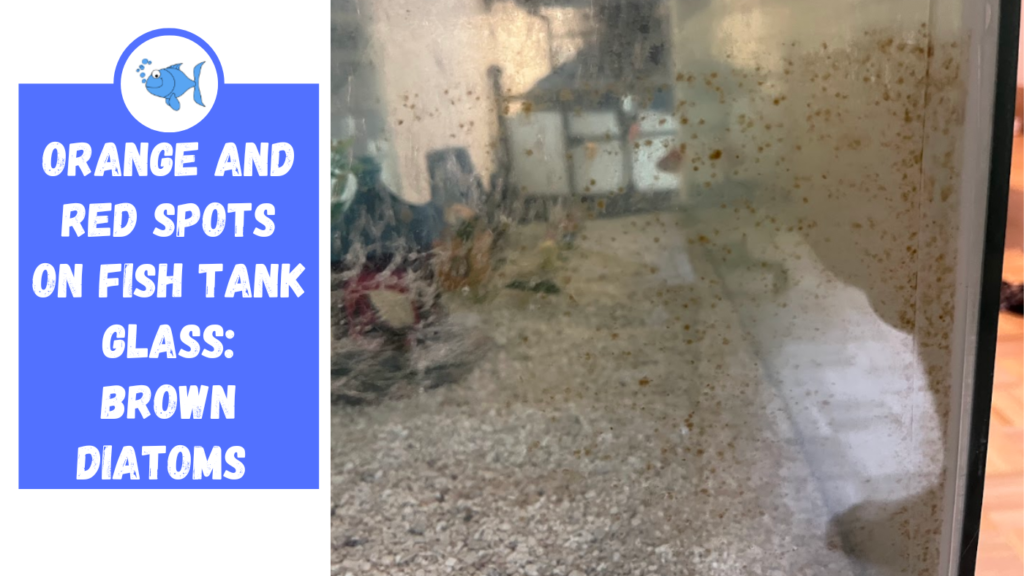If you have a fish tank, you may experience weird substances growing on your fish tank glass. While most of the time it is just deposits form the water, it can be algae. If you have noticed orange, red, or brown spots on your fish tank glass, this article is for you.
Why are there orange and red dots on my fish tank glass?
If you have noticed an orange, red, or brown spots on your fish tank glass, it is most likely brown diatoms.
They can sometimes look like small rusty circles.
What are brown diatoms?
Brown diatoms are single celled organisms that are closely related to algae. The only difference between diatoms and algae is that diatoms feed on silica, which is a compound composed of silicon and oxygen.
What do brown diatoms look like?


Above are two pictures of brown diatoms on fish tank glass. Sometimes, they appear as a group of small orange/red/brown spots on fish tank glass. These spots can also appear as singular, big circles.
While these brown spots are usually on fish tank glass, they can also grow on fish tank gravel, plants, and ornaments.
Are brown diatoms dangerous to your fish or plants?
Aside from ruining the visibility in your tank, brown diatoms are completely harmless to fish. However, their presence might mean that your water is a high in nitrates. Therefore, I suggest you do some water tests to make sure your fish tank water is healthy.
Plants are a different story. While diatoms don’t directly harm your aquatic plants, they do compete with them for sunlight and food. Therefore, if you have live plants in your fish tank, I suggest that you remove the diatoms. White fuzzy balls in your fish tank are more dangerous.
How to get rid of brown diatoms in your fish tank?
Most of the time, the red and brown spots on your fish tank will go away naturally. This is because the diatoms will run out of silica to feed on.
However, sometimes these spots can multiply and completely ruin the aesthetic of your fish tank.
Luckily, these spots are very easy to remove. Simply use a sponge or towel and wipe them away. It is important that you use a sponge/towel that hasn’t been exposed to any soap.
Now that you know what the red and brown spots on your fish tank glass are, you probably want to know what causes them and how to prevent them.
What causes red and brown spots on my fish tank glass?
The main causes of red and brown diatom spots are water changes and water cycling.
This is usually the case if you use tap water for your fish tank. Since tap water is high in chlorine and ammonia.
Luckily, there are many ways to prevent these spots from forming in the future.
Water conditioner
The best solution is to use a water conditioner whenever you add water to your tank. The water conditioner will help kill any harmful chemicals before they can wreak havoc in your fish tank.
Strong filter
A strong filter is another great way to prevent these red and brown spots form forming in your fish tank. You can also try adding more filter media to your fish tank filter. This will help decrease the amount of silicate in your fish tank, which is what diatoms feed on.
Water pump
A water pump helps increase the water circulation in your fish tank. This can help prevent the growth of brown algae as well as other types such as green algae. Additionally, it can also help increase the oxygen in your water.
More water changes
Another way to prevent these spots is to do more frequent water changes. Ideally, you should do a water change every week or every other week.
Algae eaters
Another way to prevent diatoms and other types of algae is with algae eaters. Just go to your nearest pet store, they will certainly have some.
Conclusion
I hope that you now understand that brown diatoms are the reason why your fish tank glass has a bunch of orange, red, and brown spots on it. As mentioned, they aren’t harmful to your fish, and most of the time they will go away on their own.
They usually appear after a water change and are especially common in new tanks.
While they won’t harm your fish, they can make it harder to view your fish. Luckily, they can easily be wiped away.
